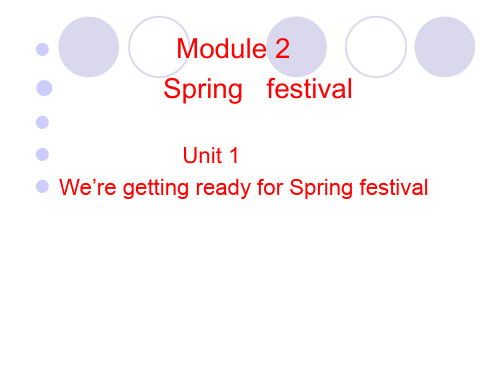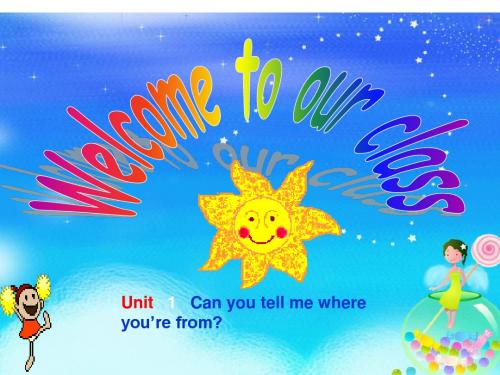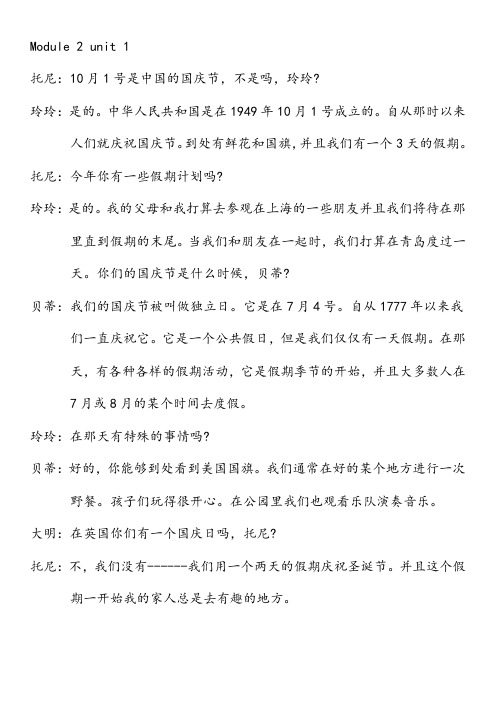Module 2 unit1
Module2 Unit1

1.Tom is listening to the music. (划提 划提) 划提 ______ is listening to the music? ? 2. My mother is working. (划提 划提) 划提 ________ is working? 3. She is cleaning the house. (划提 划提) 划提 ______ is _______ ________? 4. They are working. (划提 划提) 划提 ______ ______ _______ _______? 5.Daming is lying in the sun. (划提 划提) 划提 ______ ______ Daming ________?
Now listen and check.
1. Cleaning the house 2. Cooking the meal 3. Getting ready for Spring Festival 4. Learning a dragon dance 5. Making lanterns 6. Sweeping the floor (5) (4 ) ( ) ( 1) (2 ) (3 )
1.Tom is listening to the music. (划提 划提) 划提 ______ is listening to the music? ? 2. She is cleaning the house. (划提 划提) 划提 ______ ______ is ________? 3. They are working. (划提 划提) 划提 ______ ______ _______ _______? 4.They are sleeping now. (划提 划提) 划提 ______ are they sleeping ? 5. People are drinking in the pub. _______ are People drinking ?
Module2unit1

• whether … not • some personal questions • be on • in fact • a couple of months • close friends • feel like • make friends • part of • be different from
Everyday English
OK, here goes …
By the way, …
好,现在开始
Good luck with … 祝…顺利… 顺便问一下,…
Maybe sometime next week?
或许下周某个时间?
• 是否 • 一些私人问题
• • • • • • • • 上演,上映 事实上 几个月 密友 觉得 I want to eat one more.
What did Xiaoxin say?
He said ( that) he was full, but he wanted to eat one more.
一、宾语从句的概念
宾语从句属于名词性从句,在句中作 主句的宾语。 eg. We know Mr Green teaches English. She asked if these answers were right.
foreigner 15.外国人____________ feel like doing… 16.觉得___________ 17.顺便说___________ by the way
Learn something about telephone call.
Making telephone calls
1.友谊,友好 _______________ friendship 2.拿,举,拥有._______________ hold(held held) 3.等一下(不挂断电话)_________ hold the line right now if 4.现在___________5.是否______ whether… whether 6.是否_________7.是否________ or not personal 8.私人的_____________ 9.同班同学____________ classmate public 10.事实上________11.公众的____ in fact a couple of 12.几个,两个________________ relation close 13.亲戚_______ 14.亲近的______
外研版(三起)-英语-四年级下册-Module 2 Unit 1 London is a big city.教案

Module 2 Unit 1 London is a big city.教案一、教材分析本册教材共同分为11个模块,内含一个期末分析模块。
每个模块分两个单元。
一般,第一单元呈现要学习的语言内容,第二提供任务型练习,包括一首歌谣、歌曲或韵句。
歌谣和小诗的学习目的有三,一是培养学生的语感和节奏感,二是提高学生发音准确性,三是通过这些英语国家儿童所熟知的歌谣介绍一定的西方文化。
不常用单词不要求掌握。
希望学生结合语用和语词的基本语义,逐步获得最基本的运用英语的能力。
课文呈现了一些新的语法内容,但不要求讲解,更不要求学生掌握,只是要求初步运用这些语句。
教材注意选取了一些日常生活中学生熟悉、相对简单和容易理解的话题,学会使用形容词描述人的性格特征;学习一般将来时;一般过去式、学会提建议并参与讨论等。
本单元是整个模块教学的第一单元。
借助地图、图片认识英国的几个城市,练习使用big small beautiful等形容词介绍其他城市或者自己的家,自己的学校。
二、学情分析学情分析: 本课授课对象是四年级学生,他们活泼好动,有着丰富的想象力和好奇心,对游戏、歌曲等活动特别感兴趣。
也因为有一定的英语基础,他们的表现欲很强。
他们对外面的世界,特别是外国的模样充满兴趣。
因此我查找了生动形象的图片及视频,吸引学生的注意力。
营造愉悦、快乐的课堂氛围,充分调动学生参与活动的积极性,使学生在亲身体验中展开有效的学习,保持学习英语的欲望和兴趣,从而提高英语学习的效率。
本课讲述的是玲玲和艾米一起看书,这是一本有关英国伦敦的书。
在看书的过程中,玲玲向艾米询问书中的建筑,并对其中的建筑物进行描述,同时艾米也进行了相应的介绍。
学生通过本课的学习增强了跨文化交际意识,提高了跨文化交际能力。
三、教学目标1、语言技能听:全体学生能听懂:London is a big city. My house is very small, but it`s beautiful. It`s very old.说:全体学生能说:London is a big city . My house is very small, but it`s beautiful. It`s veryold.读:全体学生能认读:city, ship ,beautiful,whose ,close, old写:全体学生能拼写2-3个自选词语2、语言知识功能:描述一座城市、一处景物或一件物品。
六年级上册英语教案Module 2 Unit 1 I went to Chinatown in New York yesterday外研社

Module 2Unit 1 I went to Chinatown in New Yorkyesterday.本课是六年级上册第二模块第一单元。
话题是过去的活动,主要语言功能是运用过去时来描述过去的经历。
Unit1的课文情境是Daming 在给妈妈写电子邮件,他在邮件中写到自己昨天去了唐人街。
唐人街上到处都是中国人,有许多中国商店和中餐馆,人们讲英语,也讲汉语 。
他和Simon 中餐馆吃了饭,发现唐人街的中餐和中国国内的中餐有些不同。
然后他们在街上看了舞狮表演,Simon 非常喜欢,他很想到中国学汉语,看长城。
本课的重点是让学生对唐人街有所了解,并运用一般过去式来写电子邮件。
1. 能认读单词surprise 、everywhere 、restaurant 、dancing ,并能认读相关句子。
2. 能准确找出文中表过去式的单词,并能写出其原形。
【能力目标】1. 用过去时表述过去发生的事情。
2. 学会写一封电子邮件。
【情感目标】了解中华文化,增强民族自豪感,养成合理的跨文化心态及与各国人民友好相处的意识。
用一般过去时完成一定的任务。
【教学难点】用一般过去时完成一定的任务。
Simon 和Daming 人物图片及实物教具等。
学生准备:学生用书、笔、个人收集的物品(实物或照片)Step 1. Warm- upFree talkStep 2. Previewa puzzleT: Yesterday I got an email from Daming. He went to an interesting place. But he didn't tell me the place. He gave me a puzzle. Can you help me to guess?There is a place.It’s not in China.But----There are many Chinese people everywhere.There are lots of Chinese restaurants.Where is it?(复习there is/ there are.同时引出主题:Chinatown)Ss:It’s Chinatown!教师利用多媒体课件教学单词ChinatownStep 3. Presentation1. dancing,everywhere,past tense words: had,went,sawT:The Chinatown is fantastic,right?Yesterday I had a dream.I went to Chinatown in my dream.(have--had,go--went)(PPT展示,字体标注过去式)And I saw--- (see--saw)Chinese dancing in the street;Chinese people everywhere;And many Chinese shops.(通过ppt 和单词卡片展示教授单词dancing,everywhere)2.restaurant,different,surprise,past tense words: spoke,ateT: Then I felt hungry.So I ate in an American Chinese restaurant. (eat--ate)I had a surprise!The food was different!The people spoke Chinese and English. (speak--spoke)(PPT 和单词卡片展示教授单词restaurant,different,surprise)3. Now we know many things about Chinatown. Our friend Daming went to Chinatown. And he told his mother about Chinatown in an email. Now listen and understand.4. Read again and answer questions.1.What did people speak there?2. Where did they eat?3.What did they see in the street?4. Did Simon like the Chinese dancing?5.Where does Simon want to visit?Step 4. Practice1.Activity: Do you remember?(review the past tense words)T: Daming told us what happened yesterday. When we describe sth. happened in the past,we use the past tense. Can you find the past tense words in the text? (Ask some students to find the past tense word.)2.T: Daming went to Chinatown yesterday. It’s a wonderful trip. Can you tell us about your trip? (提示用如下问题1、Where did you go?2、When did you go there? 3、What did you eat/ see/…?)T: For example,I went to the library yesterday…Step 5. SummaryKey sentences:---What did you do ……?--- I ……2. ---What did you see……?--- I saw……3. ---What did you eat……?--- I ate……Step 6. Homework1.Listen and read the text.课本、报刊杂志中的成语、名言警句等俯首皆是,但学生写作文运用到文章中的甚少,即使?还是没有彻底“记死”的缘故。
Module 2 unit 1翻译

Module 2 unit 1
托尼:10月1号是中国的国庆节,不是吗,玲玲?
玲玲:是的。
中华人民共和国是在1949年10月1号成立的。
自从那时以来人们就庆祝国庆节。
到处有鲜花和国旗,并且我们有一个3天的假期。
托尼:今年你有一些假期计划吗?
玲玲:是的。
我的父母和我打算去参观在上海的一些朋友并且我们将待在那里直到假期的末尾。
当我们和朋友在一起时,我们打算在青岛度过一
天。
你们的国庆节是什么时候,贝蒂?
贝蒂:我们的国庆节被叫做独立日。
它是在7月4号。
自从1777年以来我们一直庆祝它。
它是一个公共假日,但是我们仅仅有一天假期。
在那
天,有各种各样的假期活动,它是假期季节的开始,并且大多数人在
7月或8月的某个时间去度假。
玲玲:在那天有特殊的事情吗?
贝蒂:好的,你能够到处看到美国国旗。
我们通常在好的某个地方进行一次野餐。
孩子们玩得很开心。
在公园里我们也观看乐队演奏音乐。
大明:在英国你们有一个国庆日吗,托尼?
托尼:不,我们没有------我们用一个两天的假期庆祝圣诞节。
并且这个假期一开始我的家人总是去有趣的地方。
外研版八年级下册Module 2 Unit 1

12.英语中的打电话用语 英语中的打电话用语
1. 首次提到 “我” 用 this ,“你”用 that. Eg. 我是陈欢,你是谁? 我是陈欢,你是谁? This is Chen Huan ( speaking ). Who is that ( speaking) ? 2. 打电话时不挂断,等等 打电话时不挂断, hold the line , hold on wait a moment Don’t hang up . 3. 给某人带个口信。 给某人带个口信。 Can I take a message for sb?
根据汉语提示,完成句子。 根据汉语提示,完成句子。 By the way 顺便问一下 1. ____ _____ ____ (顺便问一下 ,why don’t you bring all 顺便问一下) your friends ? where you are from 你是哪儿人)? 2. Could you tell me ____ ______ ____ _____( 你是哪儿人 ? very different from 3. I know that foreigners ____ China ____ _________ ____ find their own countries .( 发现很不一样 发现很不一样) What feel like 4. _____ does it _____ ___________ ( 你感觉如何 ? 你感觉如何)?
私事 something ~al
4. 事实上 in fact 常放于句首 用于进一步说明 句首, 进一步说明。 常放于句首,用于进一步说明。 He often stays at home on Sundays . In fact , he prefers quietness . 5. 公共的 public adj. 公共场所 ~ places 当众 in ~ Don’t talk loudly in ~ .
外研版小学英语(三起)四年级下册Module2Unit1教材内容全解
外研版小学英语四年级下册Module2Unit1教材内容全解Module2Unit1教材内容全解Module2Unit1 London is a big city.伦敦是一个大城市。
1.Listen,point and say.听一听,指一指,说一说【情景详解】英语描述:There are two pictures in this part.There is ashort panda and a tall panda in the firstpicture.There is a big ship and a small ship in thesecond picture.汉语描述:在这部分有两幅图。
在第一幅图里,有一只矮的熊猫和一只高的熊猫。
在第二幅图里,有一艘大船和一艘小船。
【课文全译】This panda is short,but that one is tall. 这只熊猫很矮,但是那只很高。
This ship is big,But that one is small. 这艘船很大,但是那艘很小。
【课文注解】①ship(名词)船,形近词shop商店,近义词boat 小船,短语:by ship乘船(My father goes to Hainan by ship.),【辨析】ship—boat,boat指的是小船;ship指大一点的船,能装货物的船;例句:This is a big ship.这是一艘大船。
There is a boat on the river.河上有一条小船。
②one在该处具有名词性质,用来代替前面提到的可数名词单数,以避免重复。
如:I have a sister.She has one too.我有姐姐。
她也有(姐姐)。
This book is good.That one is goog,too.这本书好。
那本书也好。
This apple is red.But that one is not red.这个苹果是红色的,但那个不是红色的。
Module 2 Unit 1 She is reading a book外研版四年级英语上册
She’s reading a book.
Chant together
Walking walking, walking walking, Jump jump jump, jump jump jump,
Running running running, running running running,
play with a toy train 玩玩具火车
playing with a toy train 正在玩玩具火车
Let’s dub
L’s act
Let’s say more
It is playing It is reading It is watching TV. with a toy car. a book.
take pictures 照相
taking pictures 正在照相
What is she doing? She’s watching TV.
watch TV 看电视
watching TV 正在看电视
What is he doing? He’s playing with a toy train.
Ask and answer
Let’s talk
playing She is ______ basketball. She is _w_r_it_in_g_ a letter.
He is _sw_i_m_m_i_n_g.
They are _r_un_n_in_g_.
Sum-up
询问正在做的事情: What is + he/she + doing? 回答: He/She + is +…-ing.
Watch and answer
Module2 Unit1外研版初一下册
附件:《外研版七年级英语下册Module2 Unit1》教学设计与教学反思单位:临朐镇北苑中学姓名:李艳霞听说课教学设计(外研社新标准英语教材初中一年级下册)Module2Spring Festival Unit1 We’re getting ready for Spring Festival.教案背景:1.面向学生:初一2.学科:英语3.课时:1课时4.课前准备:1)学生网上搜索关于“Spring Festival.”的相关活动,并预习本课单词。
2)老师制作多媒体课件向学生展示春节人们在做什么。
3)教具:Tape recorder, video, multimedia一、教材分析(Teaching Materials)本模块是以“Spring Festival”为话题,展开对“现在进行时”的各种问句的学习、练习和应用。
Unit1是一节听说课,主要是以听和说为主,用现在进行时对春节的活动做介绍。
引导学生通过听力、对话的学习介绍使用现在进行时,对话题进行展开听、说、读、写方面的语言训练。
通过听说熟练掌握关于春节的内容,使学生了解春节的一些事情。
二、学情分析(Analysis Students)初一下学期部分学生缺少丰富的语言基础,对某些任务的完成有一定的难度。
但他们有较强的记忆力和模仿能力,有待培养知识的扩展运用能力,教材语言安排符合学生的认知规律,让学生有熟悉感。
而学生对于现在进行时已经有了掌握和了解,这就为本句型的学习作好了铺垫。
对于本单元的话题“festival”学生比较感兴趣,这就为本节课的开展做好了情感上的铺垫。
三、教学目标(Teaching Aims)1、学习目标:掌握单词,短语及现在进行时的问句形式。
2、能力目标:能够通过听的训练从对话中获得有效信息能用所给信息谈论春节。
3、情感目标: 乐于了解中国传统节日,拓展学生视野,提高学习兴趣。
重点:掌握描述节假日的基本词汇;读懂含有现在进行时的句子;掌握现在进行时的结构和用法。
五年级上册英语课件-Module-2-Unit-1-What-did-you-buy
How many bananas did you buy? How much cheese did you buy?
“how many”和”how much”都 是用于询问“多少”的:
“how many”用来提问可数名词的数量 ,
”how much”用来提问不可数名词的数 量。
单词:food, need, cheese, 短语:shopping list, how much 句子: What did you buy? We bought... How many apples did she say? How much cheese did she say?
New words: 1. need 需要 2. food 食物 3. kilo 千克,公斤 4. cheese 奶酪 5. how much 多少 (用于不可数名词) 6. shopping list 购物单
supermarket
Yesterday I we超n市t shopping.
Shopping list
模块句型
• How many… did you • How much…did you
buy?
buy?
• apples • pears • eggs • bananas • watermelons • cakes
• water • meat • milk • cheese • fish • rice
• “how many”和“how much”都是用来询问“多 少”
eggs
meat
How many bananas did you buy? How much cheese did you buy?
How much meat did you buy?
